Part 22: Growing Up
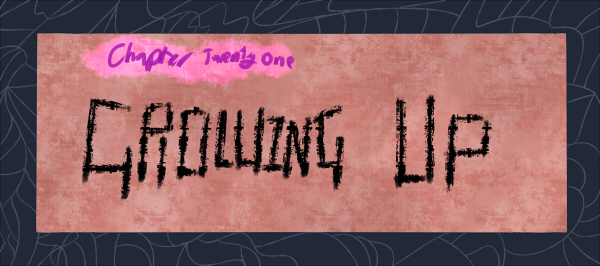
The lonely pennant fluttered over the land of Denmark.
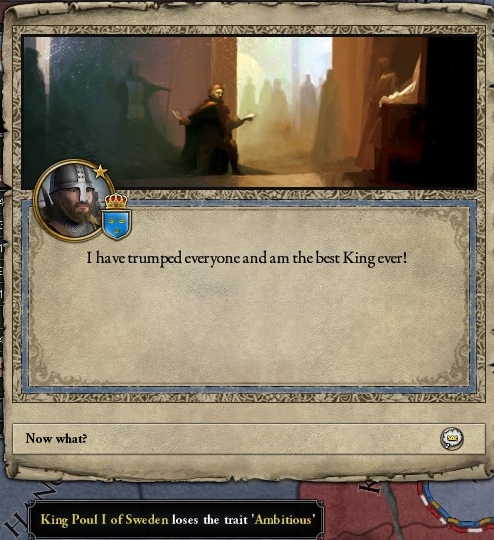
The Legend of the North had gone quiet, leaving behind a Scandinavia fulfilled.
The Poles were crushed, humiliated. Finland was reclaimed from the Khans. Even the Holy Roman Empire had been humbled.
For a moment the world had seemed like it was about to end. Now a new balance had been reached: a compromise between all the great powers.
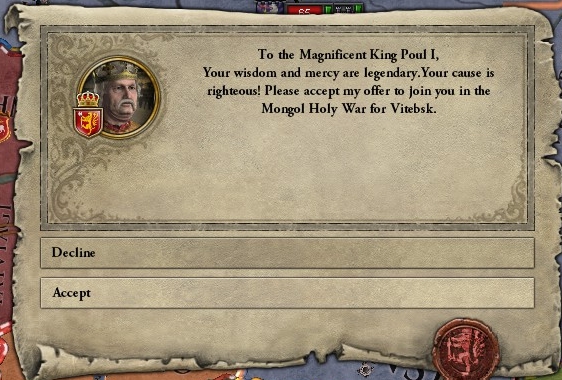
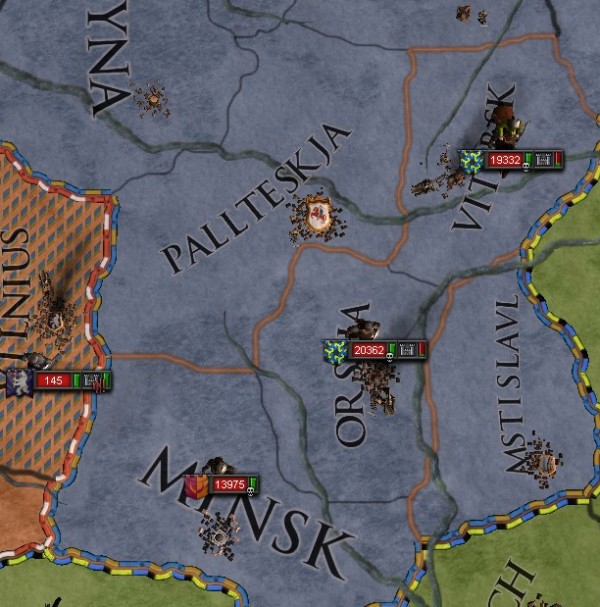
The Mongols of the Ilkhanate had wasted not a second on hearing of the death of the Legend, and stormed across the border into Lithuania. They believed that the pup who had been carried by his grandfather would break when tested.

Even if they had been right, it perhaps would not have mattered.
The Kingdom had been through many changes since the Legend had come to power, not the least of which was a massive centralisation of power and authority and the creation of a civil service. This rudimentary skeleton of a modern nation-state, this hint of governance at the expense of nobility, was certainly enough to mobilise vast armies. The armies of Modern Denmark were able to outnumber and crush the Khans as the barbarians they were.
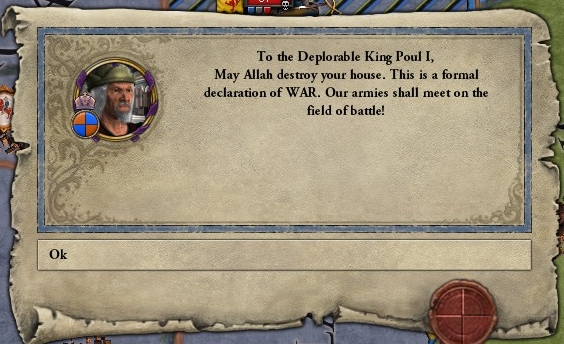
But still the Khans came - the lord of the Golden Horde announced his own invasion just as Denmark stood on the brink of throwing the Ilkhanate back.
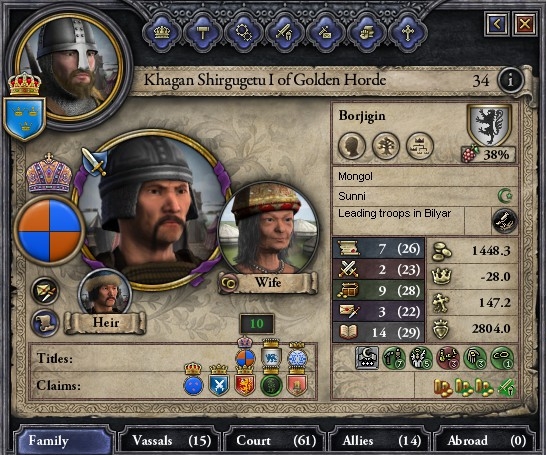
But, as the story goes, when the Golden Khan arrived at the border and faced the army of Denmark he flew into such a rage, spitting and cursing and whipping his men into a frenzy that the strain was too much for him and his heart gave out. The armies of the Golden Horde then withdrew to deal with one of their customary succession crises, leaving Denmark untouched.
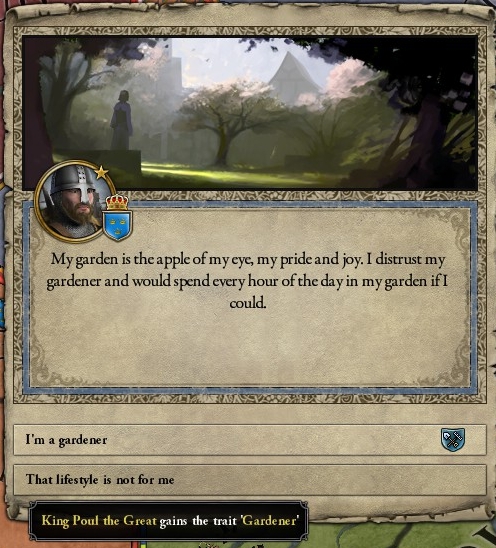
While the apparatus of State waged war on his behalf, the King was free to engage in his own past-times, notably gardening, from the safety of the palace. The days of kings leading from the front like viking warriors of old seemed be passing.
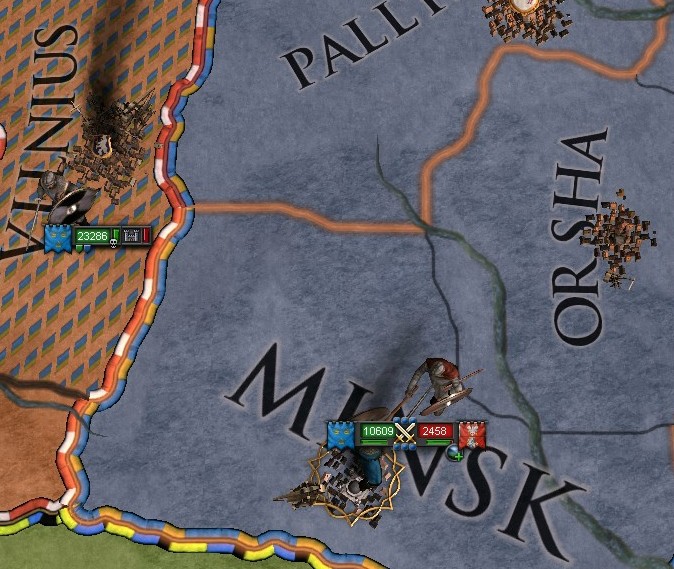
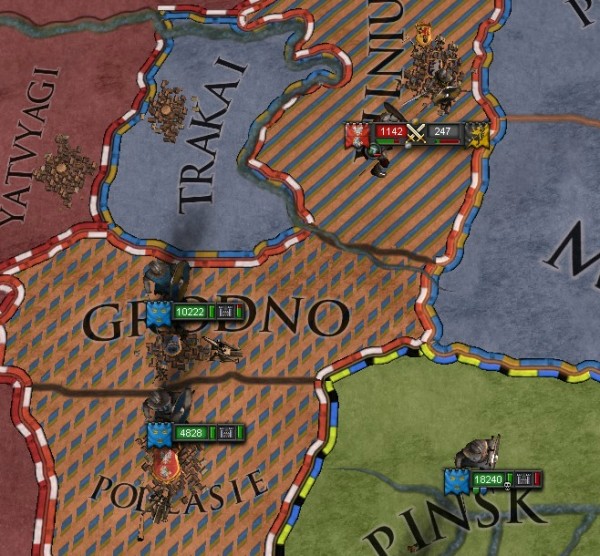
Entirely capable without direction from their liege, having been trained and honed in the endless wars of Duke Poul the Armies of Denmark continued to mop up border insurrections and Mongol invaders.

The heir apparent was as much a product of this new school of Monarchy as any other. Lazy and indulgent, he was raised to rely on the military prowess of his loyal dukes rather than lead the men from the front. While others mocked Denmark's new breed of poet-king, none could deny the effectiveness of the professional army. Keeping the name of the Legend who had lead them alive, the Legion of the North triumphed over all foreigners.
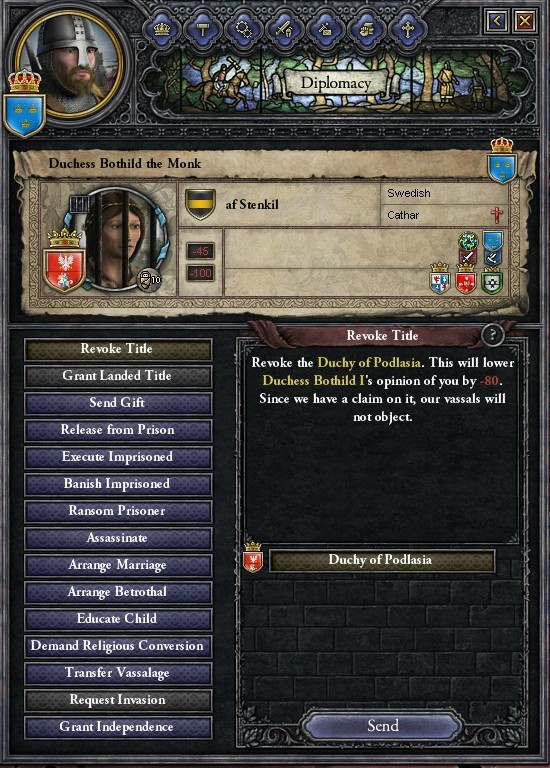
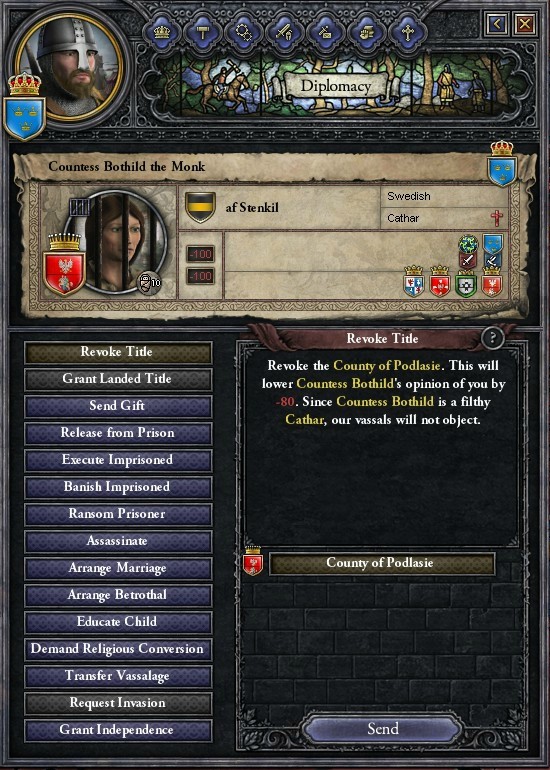
The rogue Duchess Bothild was brought in chains by the Legion, and was stripped of her titles as punishment for her heresy and treason. The King was about to execute her and her collaberators when his Steward halted him with a fact he scarcely himself believed.
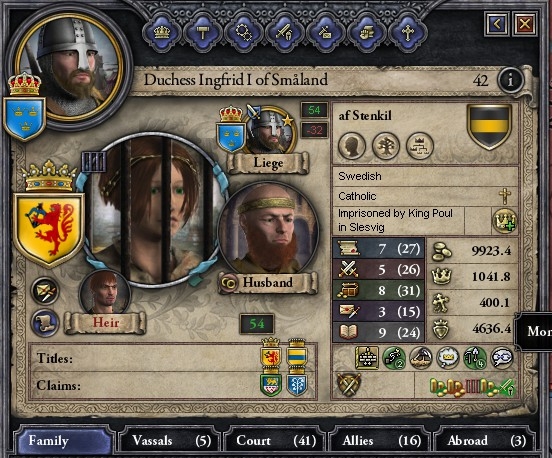
The Duchess Ingfrid was the last direct heir of the af Stenkil line who had once ruled Sweden, and she had inherited an... improbable sum of money from her once vast family holdings. Nearly ten thousand ducats, the Steward said, though he scarcely believed it. Enough to keep the Rus Legion on retainer for fifty years!
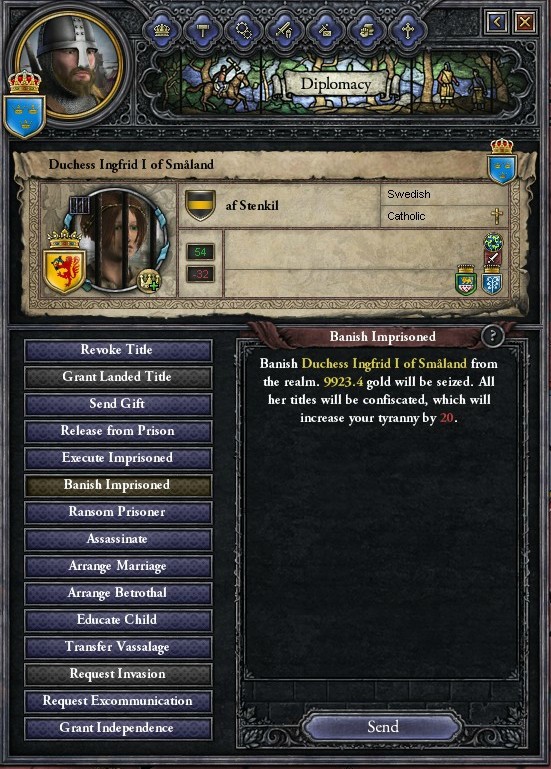
The seizure was technically illegal, but the King considered it well worth it. A small army of servants was hired to cart all the gold and jewels so long hoarded from the Duchess' castles.
Funded by this sudden, spectacular and unexpected surge of wealth, the King was able to achieve a long held ambition:
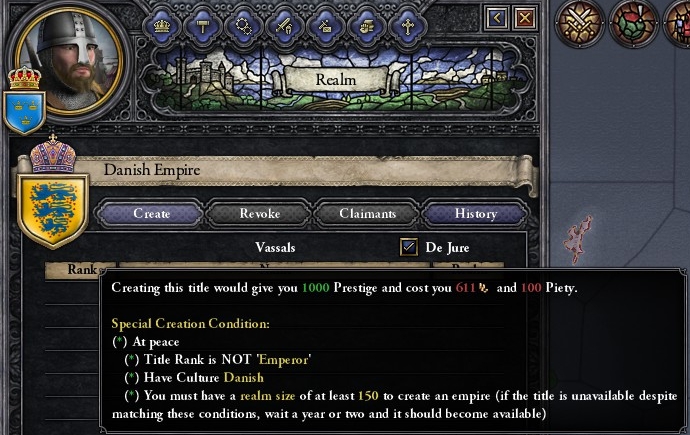


EMPIRE.
There was some discussion in the new Emperor's circles as to the Empire's name: Should he title it Denmark or Scandinavia? The name Scandinavia held a greater prospect of cultural unity between Sweden, Norway, and Denmark - but ultimately, the Emperor decided that his ambitions were greater than merely holding onto Scandinavia.
With the remainder of the wealth, the Emperor invested vast amounts of money in the empty lands Finland and northern Norvgood, long avoided by settlers. New cities were constructed across the arctic lands and the barren wastes would one day become prosperous and productive city centres.
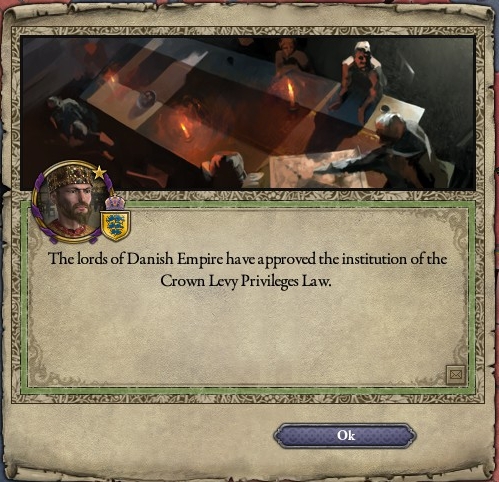
Further centralisation of the State was undertaken, putting the Legion of the North under the sole command of the Emperor and proven nobles.

And after this, the Emperor began to open his eyes again and see the possibilities of further consolidation. No longer was he prepared to tolerate heresies, corruption or lapses amongst his servants - the Emperor sought total obedience on every level of society.
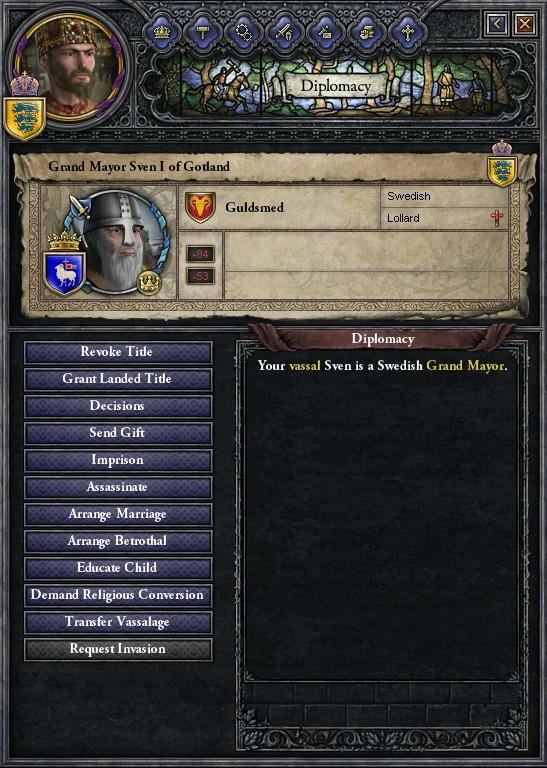
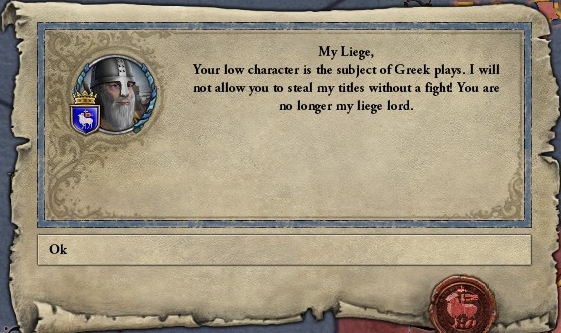
The process started with commanding the merchants of Gotland to submit to the new bureaucracy, a command the merchants refused. Their resistance was commendable but short-lived, and they were utterly crushed by the Imperial armies. The trade republic of Gotland was destroyed and recreated, entirely under the authority of the Crown.
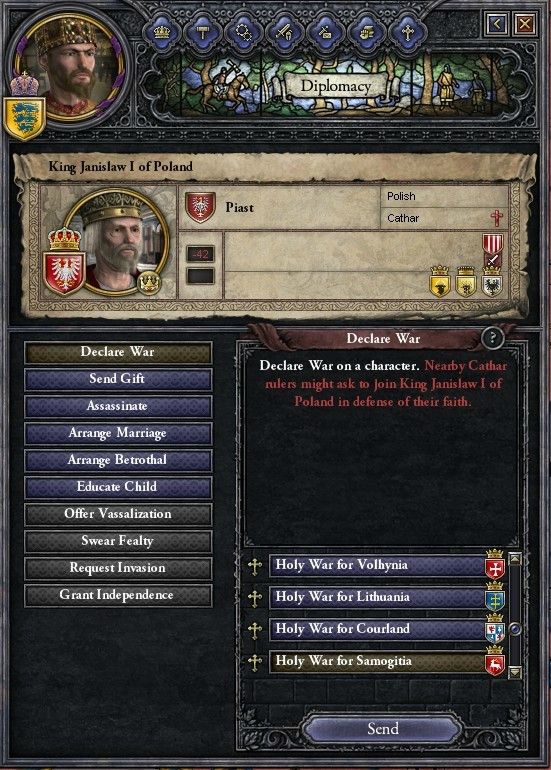
Next, the Emperor turned his attention back to the Poles, determined to cut them off from the Baltic once and for all.


Like a well oiled machine, the Legion of the North broke the Polish resistance and proclaimed victory.
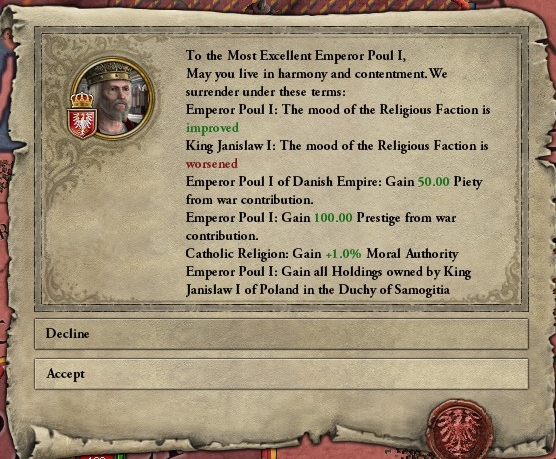
The victory was especially humiliating for the Poles because of how one sided it had been. With each subsequent defeat the Poles had gotten weaker and Denmark had gotten stronger, and the disorganised Polish were no match for the centralised organisation of Denmark.
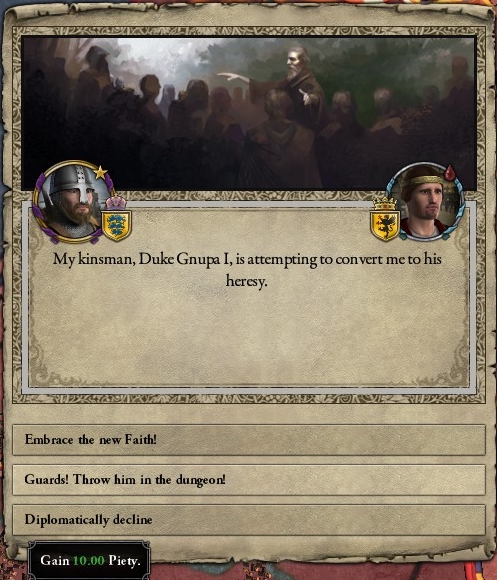

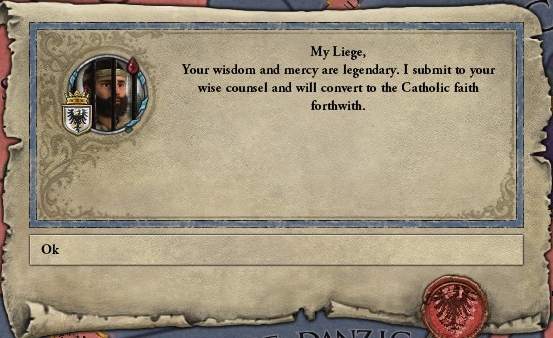
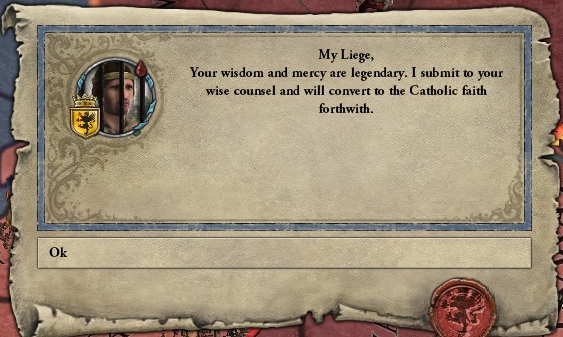
Internally, the Emperor ruthlessly rooted out all hints of Catharism, forcing each of his Dukes to swear allegiance to the Cross and Rome - at swordpoint if necessary.
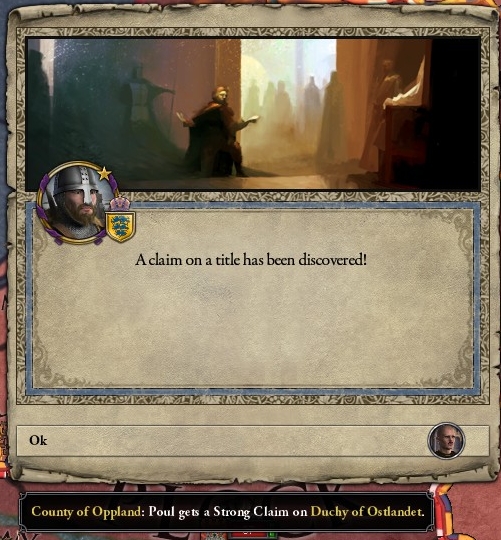
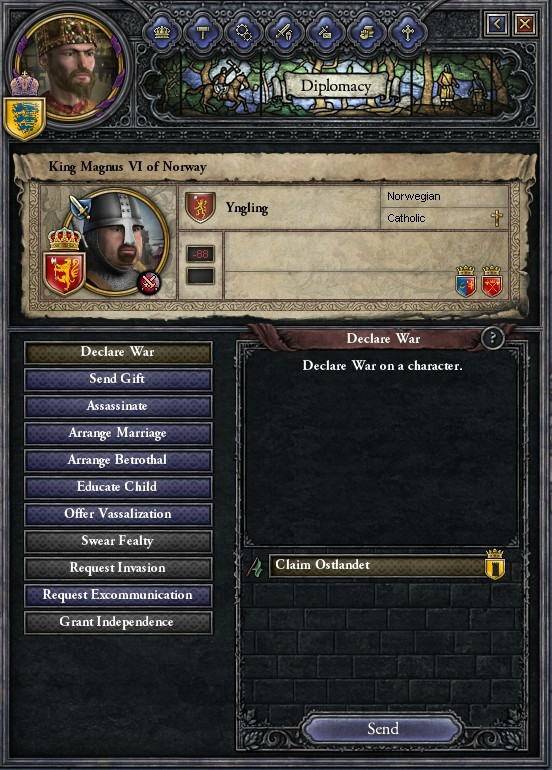
The Emperor's ambition even lead him to invade Catholic Norway purely to help solidify his strategic position. He confiscated some of the most valuable territory in Norway, effectively crippling the state that had once ruled Denmark and reducing them to an irrelevant rump state.
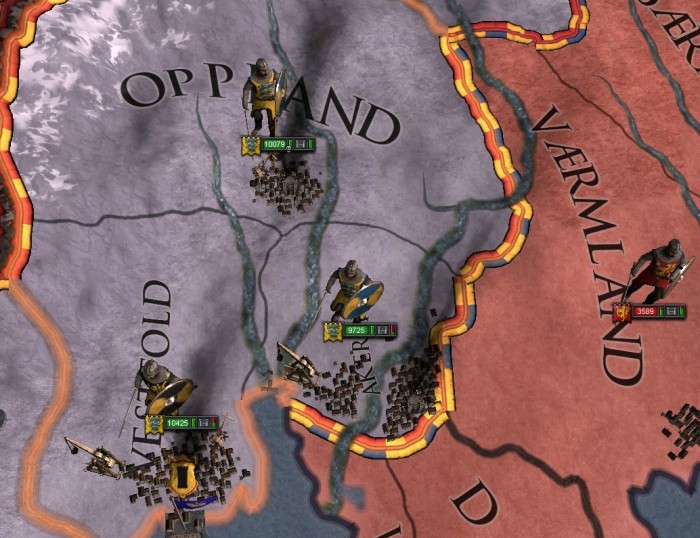
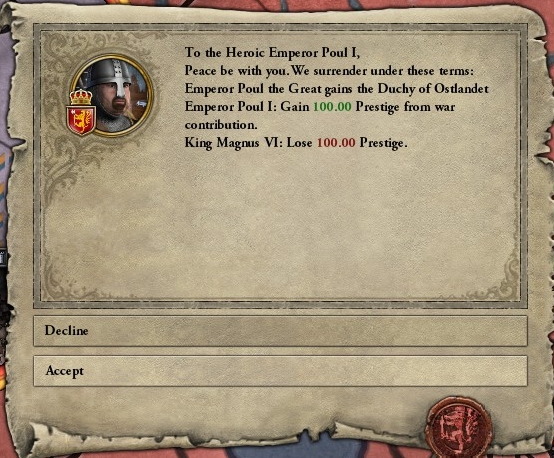
The Legion of the North barely even noticed the Norwegian resistance as they rolled over them. The King of Norway surrendered, knowing full well that his eventual annexation was inevitable.

Amidst the nobility, though, there were murmurs and whispers of discontent. Few dared of crossing Emperor Poul, who seemed to be just as effective at managing a state as his grandfather, but many were quietly appalled at this shocking destruction of feudal values.
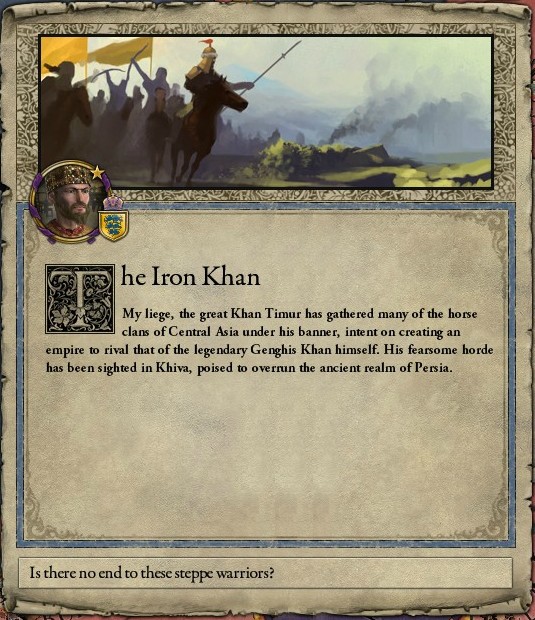
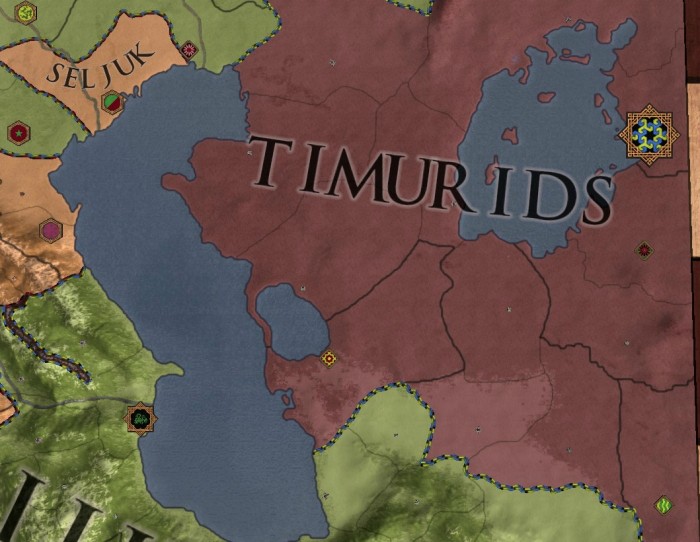
But their voices were silenced, for Asia had one final test for Europe.
Timur, the Lord of Iron, the last and most terrible of the Khans of the Steppe, had arrived. A hundred thousand men marched under his command and it was said that he would do what his brother Khans had never been able to do.
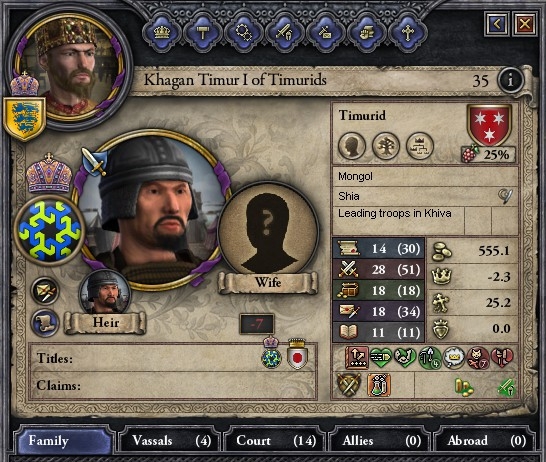
Timurlame - Timur the Lame, so named for a horse that had fallen on him as a youth, crushing his legs and leaving him with a limp. He was said to never leave his warhorse as a result, eating and sleeping in the saddle, shunning the luxuries of the decadent lands he conquered. He had his eyes set firmly on eternity, and all the stories Emperor Poul heard told him that this was a man he dare not cross.


So he took a step none expected - he offered the Khan his daughter's hand in marriage. He hoped this alliance would deter the Khan's wrath and send him into the teeth of his enemies, should the Khan make his way to Denmark. Timurlame accepted.
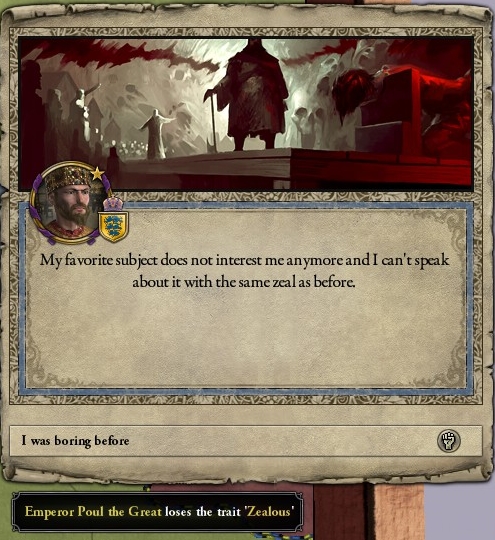
The decision weighed heavily on Emperor Poul's mind. He had given his firstborn daughter to a heathen to cement his temporal safety. These were the decisions that had to be made by rulers in this mad, heretic world, and a new pragmatism wrapped him.

A pennant flew over Denmark. The Emperor had ordered the last great Tournament of the age held.
Warriors from all nations came to compete, to joust and to duel with swords as though it was the dawn of the medieval age. The mood of the moment was overshadowed by the armoured, disciplined and stern ranks of the Legion of the North who provided security for the event. Rank after rank of armed, armoured, professional heavy infantry stood shoulder to shoulder and silently watched as the nobles fought and duelled in the summer sunlight.
This was the last of the great tournaments, the last time violence would be mere spectacle for the nobility. New tactics and new techniques were being brewed in the minds of those stationary, iron soldiers, techniques that would make the fencing and jousting of those noble knights and the heroism of the individual increasingly irrelevant.

It was a glorious, fading moment, disappearing into the sunlight that so briefly danced across the roof of the world.
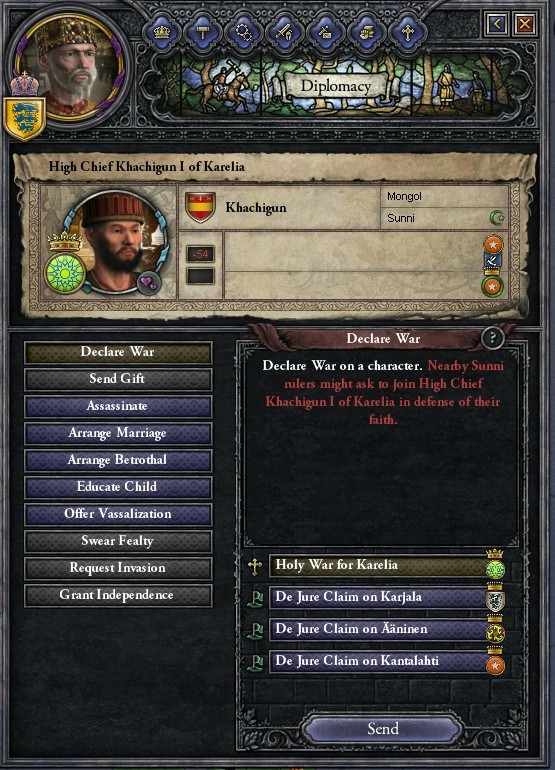
And after that, it was the Legion and not the nobility that marched out into the snow again. Ranks of grim soldiers departed for Finland.
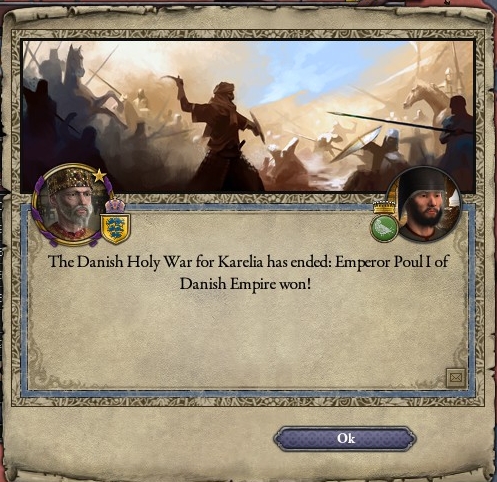
They returned with crowns, lands, and very few of their fallen brothers. The Legion knew the tactics of the Khans and were ready for each new conflict.
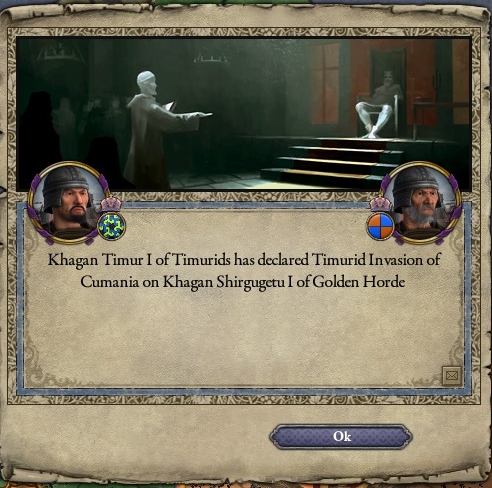
As the Legion shattered the remnants of the Golden Horde in the East, the Khan of Iron fought them in their homeland and broke them for ever.
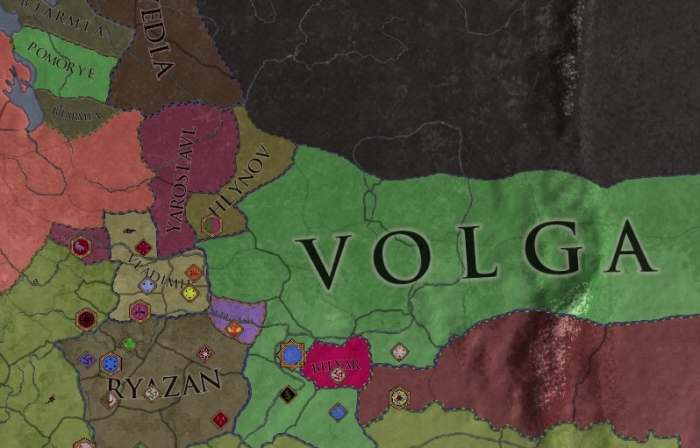

He declared the Golden Horde forever vanquished and all survivors were to join his conquering army. And so ended one of the once-great threats to the world, absorbed by the Iron Khan and made no more.
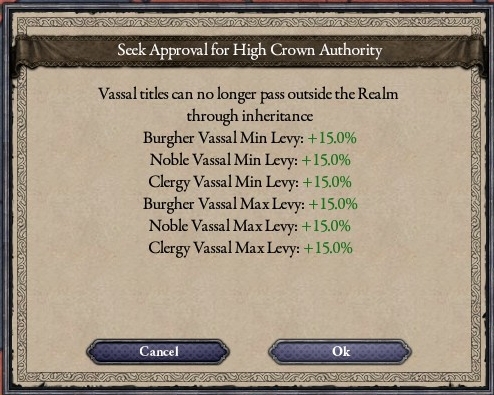
In Denmark, the march of progress reached it's pinnacle. The Legion of the North demanded logistics. The Legion required roads, supply trains, organised supply dumps and mustering sites, standardised equipment. The Legion demanded only the best commanders, often shaming the Dukes that lead them to defeat. The Emperor gave his Legion anything they required, and the Legionnaires were grateful.

The Legion repaid the Emperor with another Crown, the testament to all their work in Russia and the frozen lands of the arctic.
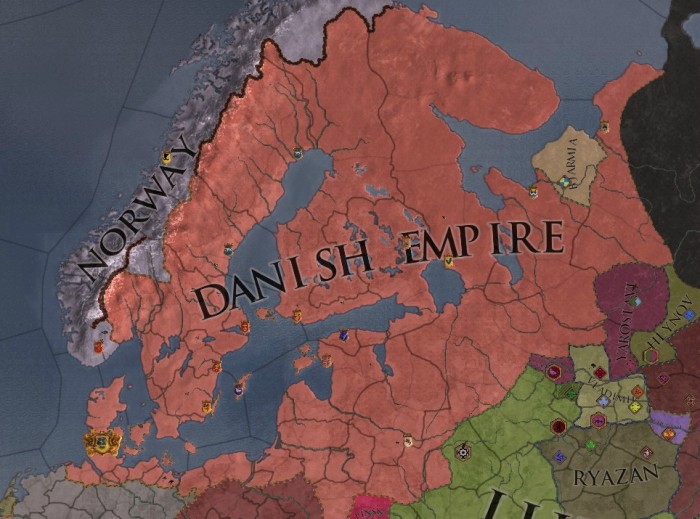
The Danish Empire had reached it's greatest ever extent, and considered itself a match for any power that dared to face it.
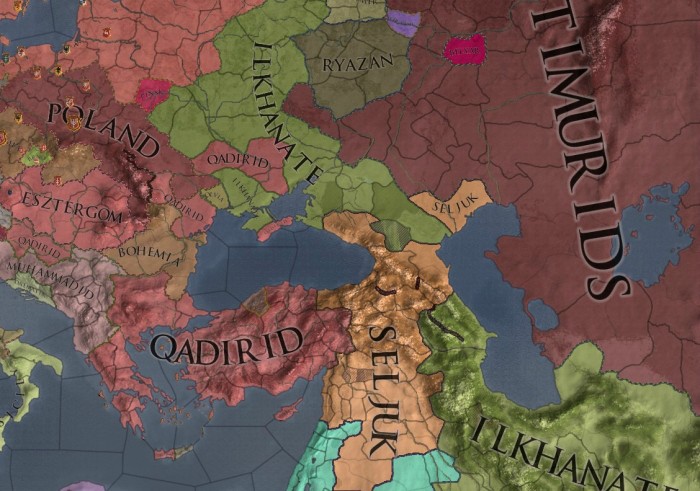
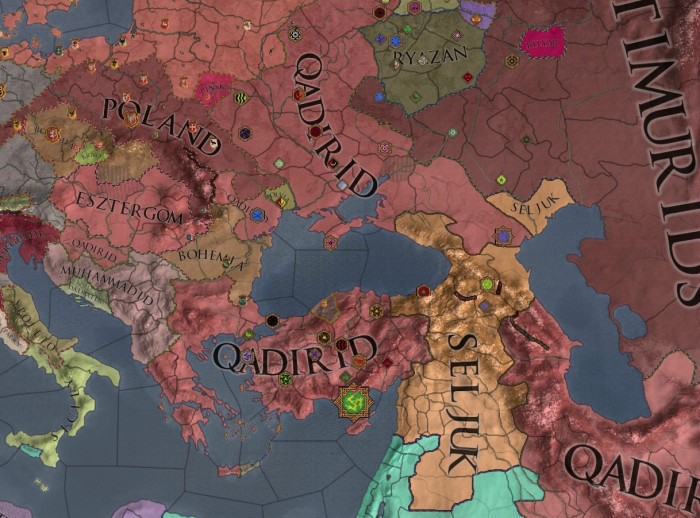
The Iron Khan, meanwhile, had dealt a crushing blow to the Ilkhanate and shattered them just as totally as he had shattered the Golden Horde. The disorganised remnants of the Ilkhanate swore allegiance to the Sunni Caliph, making the Qadirid Sultanate a superpower dominating Turkey, Greece, Russia and Persia.
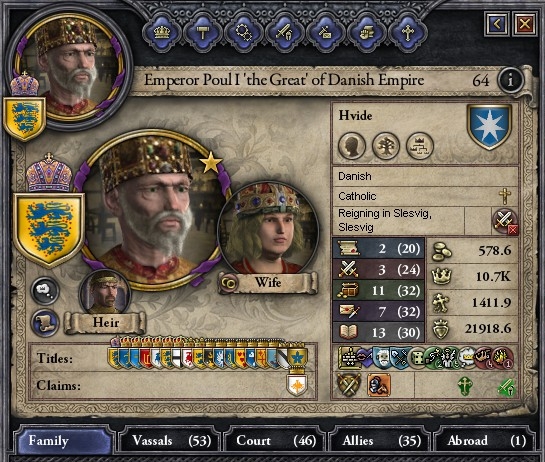
At sixty four, Emperor Poul had lived up to the example set by his grandfather. The Legend of the North had a worthy heir, who had consolidated the gains made by the Legion of the North into a new way of thinking - a new way of waging war.

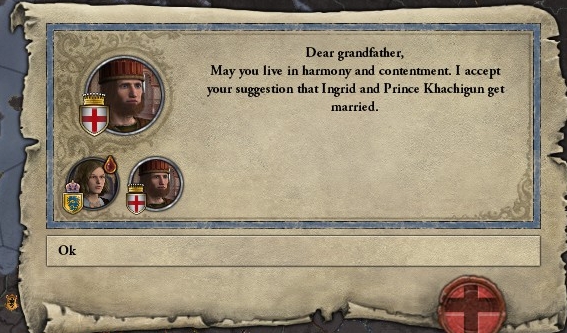
He also noted with a quiet smile that the Khan's first born son, the heir to the Timurids, had pale skin and his eyes. If the line of Hvide stood to inherit even the lands of the Lord of Iron then surely his family would never vanish from the world entirely.
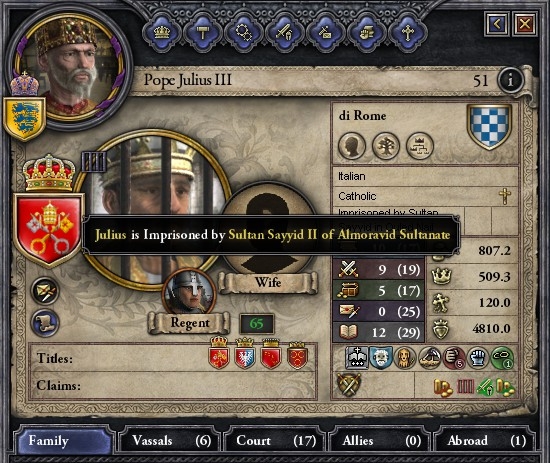
Even if Catholicism did - the Pope had been captured by the Qadirid Sultan and would spend the next thirty years languishing in a Turkish prison. Though Denmark could not project force far enough to release him, the Emperor decided to at least bloody the Turks for the insult.
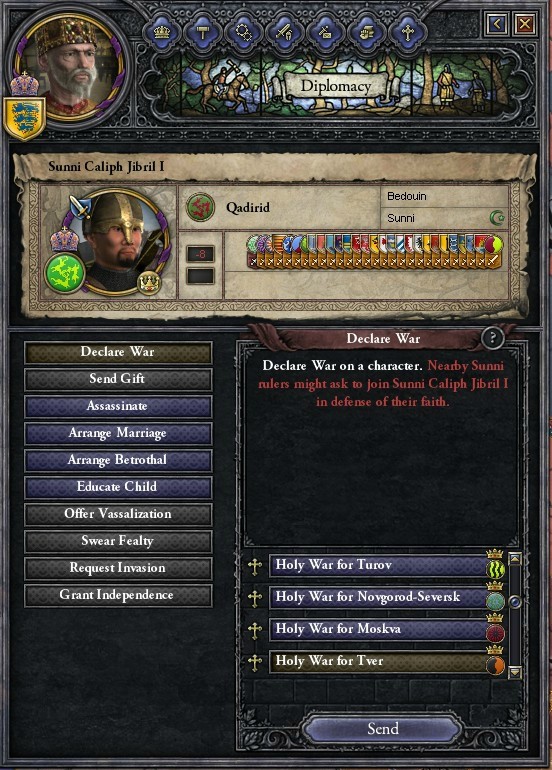
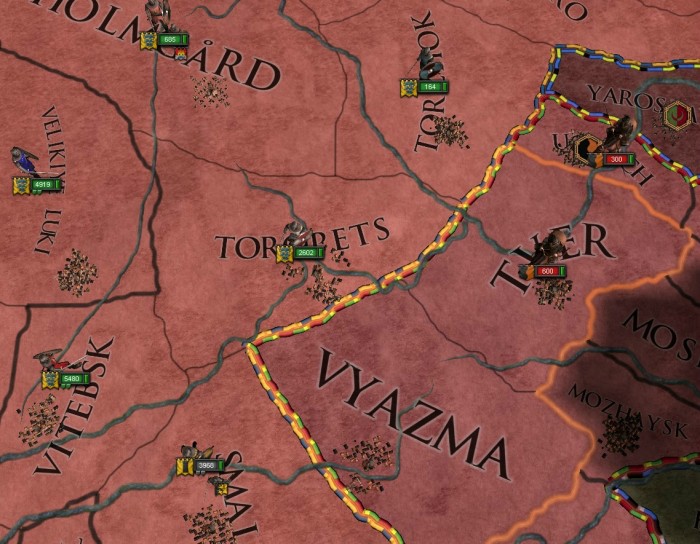
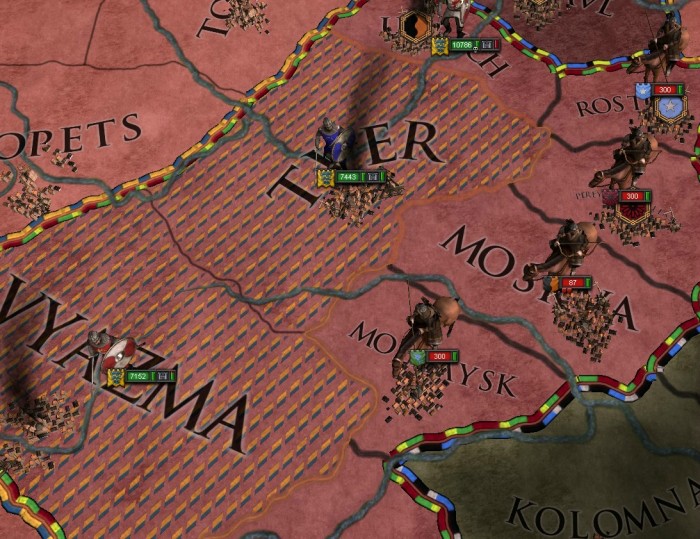
As smooth as silk flowing over a blade, the Legion took to Russia and broke the Turks there. There had been civil war and distractions occupying the Emperor's mind at the time, but the message was clear: In the North, you are at our mercy.
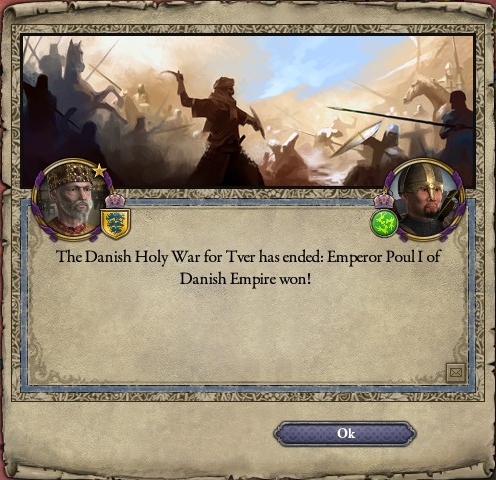
A foolish gesture, perhaps. The Muslims swore revenge and they would repay the Emperor in kind soon enough.
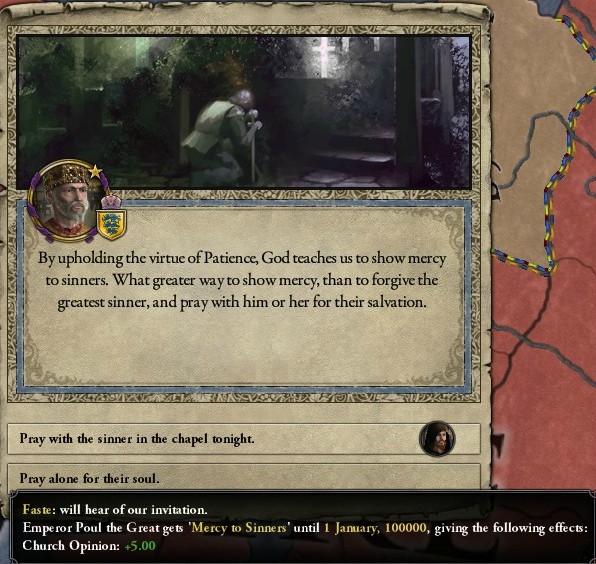
But for his part, the Emperor of Denmark did not participate in the last great campaign he would command of the Legion of the North. He spent his twilight days in the chapel, speaking quietly to God through the night.
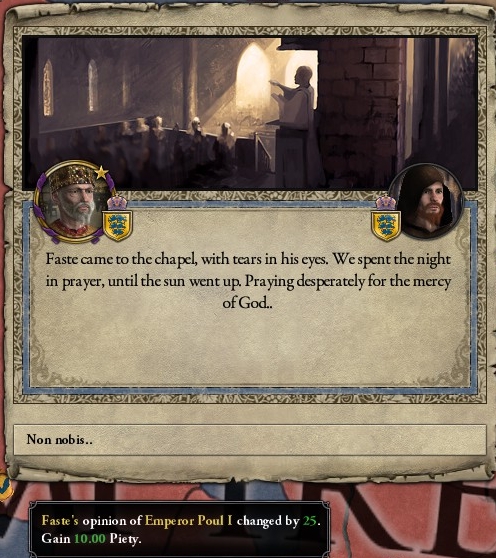
He stayed up until the dawn, talking to the sinner who he had met there. He reflected on his life and what he had done, his story and his achievements. He was great, certainly. He had accomplished great things; he had solidified the precedent set down by the Legend into a comprehensive doctrine for an army, stabilised a society, and turned the achievement of one man into the seeds of a new Emperor.
Nobody cares about what he said, what he felt, what he believed. His story does not matter. And it does not matter because of the very accomplishments he made.
This wasn't his story any more.
It wasn't even the story of House Hvide any more.
From this point onwards, the story was about Denmark. The story was about the Empire that the two Pouls had created. The story of the nation that Countess Christina, King Ernst and the Hvides of generations had created. House Hvide had achieved a miracle and created something larger than themselves.
This is a story about parents and children. And there comes a time where the child has grown up and does not need the parent any more.
Hail, Hvide!
Hail, Imperator!
Hail, Denmark!
there is one more update for CK2. Denmark has a rendezvous with destiny.